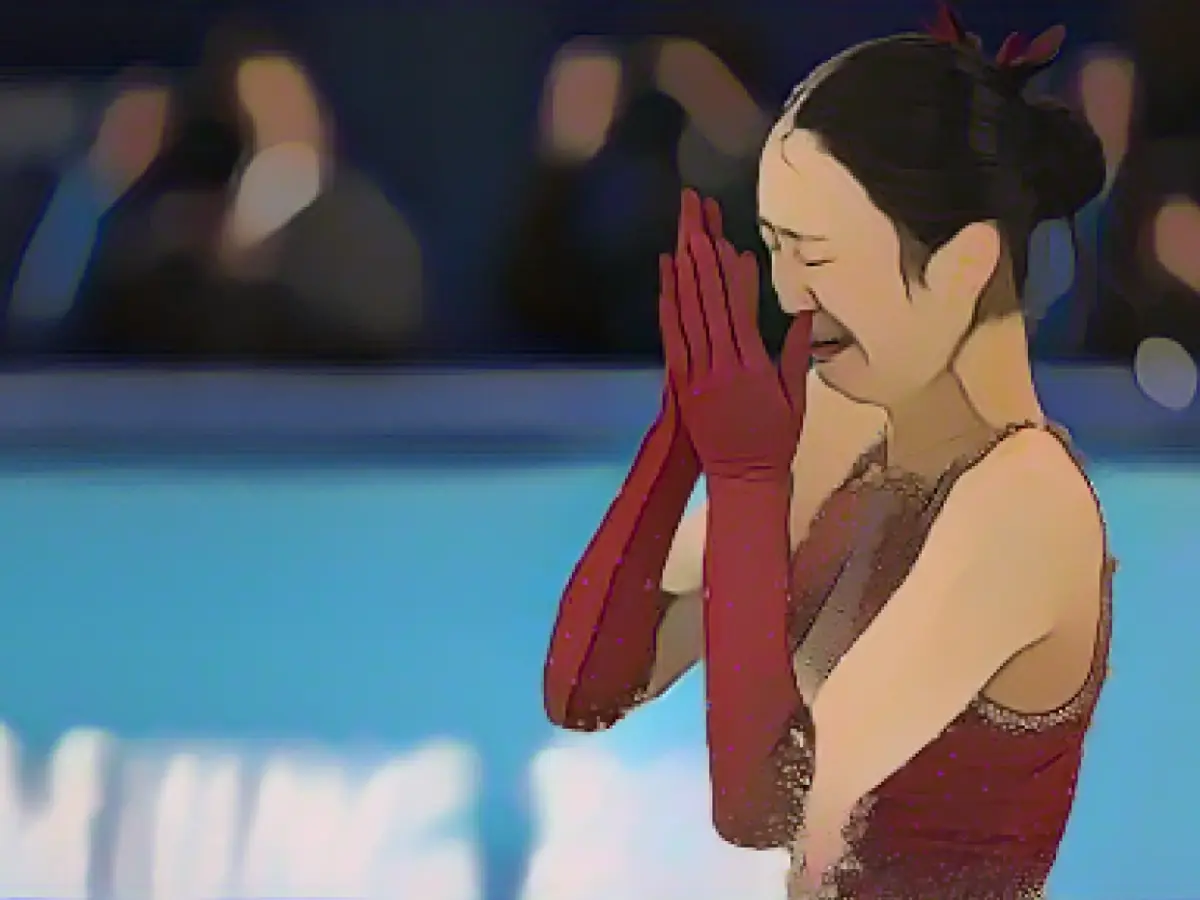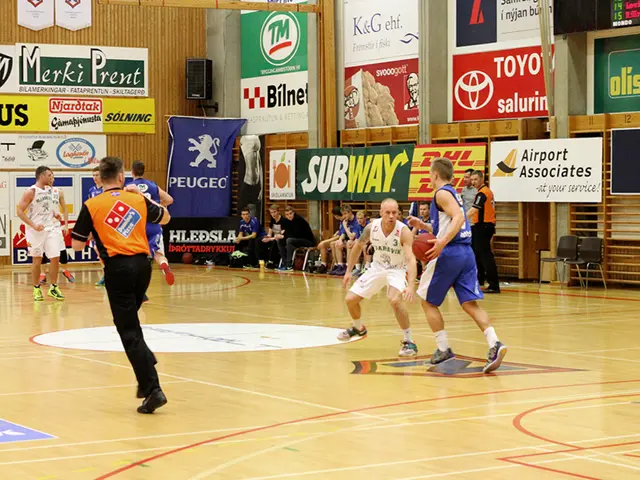What's the deal with figure skater Zhu Yi and her social media critics?
Zhu Yi experienced a significant setback at the Olympics, failing a series of jumps and ending with a disappointing score. This led to an enormous backlash on Chinese social media, with the hashtag '#Zhu Yi is down' being shared hundreds of millions of times before it was eventually censored. The comment 'What a shame' received over 11,000 likes.
It was a tough blow for Zhu Yi to handle, not only dealing with her own disappointment but also being the target of such harsh criticism in the public eye. Despite this, she returned to training on Monday with determination, demonstrating several difficult moves - albeit with another fall. Her team placed fifth.
We can pretty much guarantee that Zhu Yi is her harshest critic right now. Being unable to live up to expectations and facing public ridicule must have been incredibly painful.
Social media has long been identified as the root of many ills, but in this case, it also gives us the power to speak up when someone is being mercilessly attacked. There's indeed something we can all do to solve this problem: we can "aggressively support" her.
Author Sue Scheff, a family lawyer and expert on internet safety, discusses this approach in her book "Shame Nation: The Global Epidemic of Online Hate". "The initial humiliation can sometimes be reversed when supporters show that they stand with her. That's known as positive reinforcement", she wrote.
Let's all show our support for Zhu Yi today through social media. Let's praise her for her efforts in making her country proud and for participating in the Olympics. Let's acknowledge that nobody is perfect and we all have bad days.
Let's also appreciate her talented skills in figure skating, making it to the Olympics at all is no small feat.
It's especially important that we all contribute to turning the tide on social media shaming. Zhu was born in the US but later renounced her American citizenship and chose China. "First, let her learn Chinese and then talk about patriotism", a Weibo user commented. These cyberattacks seem to be more than just an attack on figure skating hopes.
It's also not hard to imagine that Zhu is being targeted due to her gender. Women around the world are particularly vulnerable to online abuse. According to a study by the Economist Intelligence Unit on gender in 51 countries, nearly 40% of women reported being harassed online.
Of course, it's unacceptable to publicly ridicule someone for giving their all and failing to meet their goals. But this is also a deterrent for other countries to take the necessary risks when we want our nation to succeed at the Olympics and beyond.
However, aggressive bashing is not just limited to correcting wrongs, but also has the power to change societal norms. Examples like Zhu's can contribute to redefining our society's concepts of success and failure towards promoting resilience - the ability to bounce back after a failure.
With the world facing unprecedented challenges during a global pandemic, resilience is needed more than ever.
Don't forget to sign up for our free weekly newsletter
Positive reinforcement on social media isn't just about setting things right when someone is wronged, but it can also shape societal norms. Author Sue Scheff, in her book "Shame Nation: The Global Epidemic of Online Hate", discusses an instance of a teenager in Tennessee who posted a picture of herself in a ballgown selling it to buy a new one, only to be body-shamed.
But then supportive comments poured in, leading to donations exceeding the cost of a new dress.
While Zhu is under immense pressure, it's unnecessary and unfair to expect her to always succeed. We must also remember that even in the world of sports, competitive or otherwise, not everyone can come out on top all the time, and we shouldn't be ashamed when they don't. Today, let's all use our social media accounts to send a loud and clear message to Zhu and anyone else out there dealing with online harassment - keep pushing for your dreams.
And while we're at it, how about we celebrate some of our favorite success stories?
Read also:
After facing criticism on social media, Zhu Yi returned to her training with resilience, putting forth various demanding moves - despite yet another fall. Resilience is an incredibly valuable trait that contributes to better learning, improved health, and lower mortality rates.
By offering our support through positive comments on social media, we can help correct the harmful aspects of society and contribute to the creation of a more supportive and understanding digital community.
Enrichment Data:
Positive reinforcement on social media can help shape societal norms and support figure skater Zhu Yi after facing criticism and harassment in several ways:
- Emotional Support: Positive comments, messages, and shares can provide emotional support, boosting Zhu Yi's self-esteem and resilience. This type of emotional support can help counteract the negative effects of criticism and harassment[1].
- Appraisal Support: Affirmative feedback and recognition can help Zhu Yi evaluate her progress and recognize her achievements, enhancing her motivation and commitment to her craft[1].
- Fostering Positive Norms: By promoting positive interactions and supportive comments, social media can reinforce healthy behaviors and norms. When Zhu Yi sees a supportive community around her, it can encourage her to maintain a positive attitude and continue performing at her best[1].
- Encouraging Persistence: During challenging times, positive reinforcement can encourage Zhu Yi to persevere. Supportive messages and interactions can provide motivation and reassurance, helping her stay committed to her goals despite criticism and harassment[1].
- Creating a Supportive Environment: By engaging with a supportive online community, Zhu Yi can create an environment where she feels valued and appreciated. This can help mitigate the negative impact of criticism and harassment, fostering a sense of belonging and reducing feelings of isolation[4].
- Reducing Stress: Positive interactions on social media can reduce stress and anxiety, which are often exacerbated by criticism and harassment. By focusing on supportive messages, Zhu Yi can manage her emotional response more effectively and maintain a healthier mental state[1].
To maximize these benefits, Zhu Yi could engage with her online community by:
- Sharing her experiences and achievements
- Interacting with fans and supporters
- Following accounts that promote positivity and inspiration
- Encouraging others to support her through shared goals and activities
- Celebrating her achievements with her social network to foster positive reinforcement[1][4].
By leveraging these strategies, Zhu Yi can build a supportive online environment that helps shape positive societal norms and provides her with the emotional support she needs to overcome criticism and harassment.







